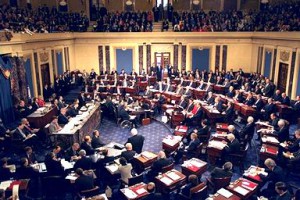
The Senate and House members couldn’t agree on spending, which led to complete shutdown of the government. Photograph courtesy of http://upload.wikimedia.org/wikipedia/commons/4/43/Senate_in_session.jpg
For sixteen days, the government shutdown dragged on. Congress and Senate couldn’t agree on passing any spending bills that would fund the government, despite the serious ramifications that followed. The government shutdown meant that most functions of government–veterans’ benefits, national parks and monuments, small business loans, and more– ground to a halt.
The biggest issue in Congress and Senate, however, wasn’t the lack of government funding- it was, and is, the Affordable Care Act, or Obamacare. House Republicans insisted that any spending bill passed include provisions to injure Obamacare. When those bills advanced to House Democrats, they shut them down, and this failure to compromise injured the American people.
Furthermore, over 800,000 federal workers worked, unpaid, until the shutdown ended and those hundreds of thousands of additional government workers had been immediately and indefinitely furloughed without pay. The president, as well as members of the House and Senate, continued to receive their wages.
Unfortunately, veterans’ access to benefits ceased, and services ensuring the elderly and young children have meals halted. Research on life-threatening diseases ceased as well.
Fortunately enough though, beneficiaries of Social Security still received checks. The U.S. Postal Service still delivered mail and active military continued serving. Air traffic controllers, prison guards, and border patrol agents worked through the shutdown as well.
The consequences to the American economy were severe. It’s estimated that the government shutdown cost about $24 billion dollars. Furthermore, the United States nears closer to maxing out their $16.699 trillion in debt. The debt limit, or “ceiling,” sets the maximum amount of outstanding federal debt the U.S. government can incur by law. If they don’t raise the debt ceiling, America will default and be rendered incapable of paying its debts and bills. This will not only affect the American economy, but global economies as well.